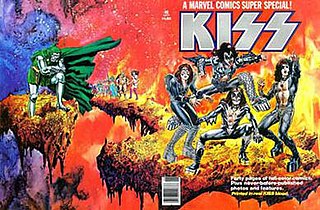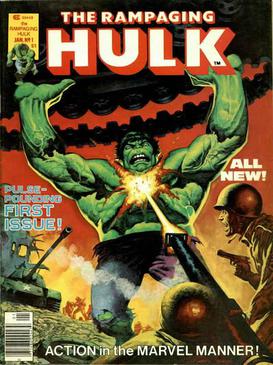
Joseph Michael Straczynski is an American filmmaker and comic book writer. He is the founder of Synthetic Worlds Ltd. and Studio JMS and is known as the creator of the science fiction television series Babylon 5 (1993–1998) and its spinoff Crusade (1999), as well as the series Jeremiah (2002–2004) and Sense8 (2015–2018). He is the executor of the estate of Harlan Ellison.

Doctor Who Magazine is a magazine devoted to the British science fiction television series Doctor Who.
Notable events of 1996 in comics.

Man from Atlantis is an American superhero television series that ran on the NBC network from 1977–78. It initially began as four TV movies that had aired in Spring 1977. The movies achieved high ratings which led to the commissioning of a weekly series for the 1977–78 season, but it was cancelled after 13 episodes due to a declining audience and high production costs.
Dan Spiegle was an American comics artist and cartoonist best known for comics based on movie and television characters across a variety of companies, including Dell Comics, DC Comics, and Marvel Comics.

Marvel Comics Super Special was a 41-issue series of one-shot comic-magazines published by Marvel Comics from 1977 to 1986. They were cover-priced $1.50 to $2.50, while regular color comics were priced 30 cents to 60 cents, Beginning with issue #5, the series' title in its postal indicia was shortened to Marvel Super Special. Covers featured the title or a variation, including Marvel Super Special, Marvel Super Special Magazine, and Marvel Weirdworld Super Special in small type, accompanied by large logos of its respective features.
Bonvi, pen name of Franco Bonvicini was an Italian comic book artist, creator of the comic strips Sturmtruppen and Nick Carter.
This is a list of comics regarding the Star Trek media franchise.

Yannis Smaragdis is a Greek film director. In October 2024, he was the first Greek director elected as a regular member of the European Academy of Sciences and Arts.

Giovanni "Ninetto" Davoli is an Italian actor who appeared in several of Pier Paolo Pasolini's films.

Damiano Damiani was an Italian screenwriter, film director, actor and writer. Poet and director Pier Paolo Pasolini referred to him as "a bitter moralist hungry for old purity", while film critic Paolo Mereghetti said that his style made him "the most American of Italian directors".
The Corriere dei Piccoli, later nicknamed Corrierino, was a weekly magazine for children published in Italy from 1908 to 1995. It was the first Italian periodical to make a regular feature of publishing comic strips.

Photo comics are a form of sequential storytelling using photographs rather than illustrations for the images, along with the usual comics conventions of narrative text and word balloons containing dialogue. They are sometimes referred to in English as fumetti, photonovels, photoromances, and similar terms. The photographs may be of real people in staged scenes, or posed dolls and other toys on sets.
Notable events of 1979 in comics.

The Rampaging Hulk is a comic book series published by Marvel Comics. The first volume was a black and white magazine published by Curtis Magazines from 1977–1978. With issue #10, it changed its format to color and its title to The Hulk!, and ran another 17 issues before it was canceled in 1981. It was a rare attempt by Marvel to mix their superhero characters with the "mature readers" black-and-white magazine format.
Bruce Lee has been portrayed in comics form in both comic books and syndicated newspaper strips.
Berto Pisano was an Italian composer, conductor, arranger and jazz musician.

Ezio Marano (6 August 1927, Brescia – 26 April 1991, Rome) was an Italian actor.

Voyages très extraordinaires de Saturnin Farandoul is a science-fiction novel by Albert Robida.










